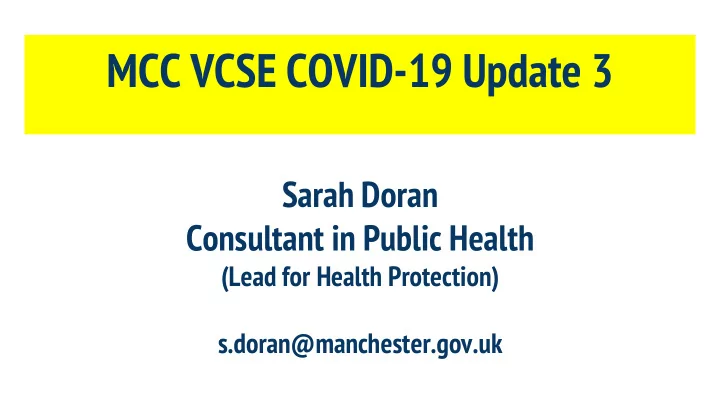

MCC VCSE COVID-19 Update 3 Sarah Doran Consultant in Public Health (Lead for Health Protection) s.doran@manchester.gov.uk
Public Health Response to COVID-19 OUTBREAK MANAGEMENT INFECTIO INF ION PR PREVENTION TEST TRACE CONTAIN AND ENABLE & CO CONTROL Advice, support and Everyone in Close contacts of People who can solutions delivered Manchester who confirmed cases in transmit the disease to protect needs a test can get Manchester are are isolated and get Manchester’s a test and there is identified and the support they residents and support to act on measures put in need to do this workers from COVID- the results place to slow spread effectively 19 of infection Underpinned by best available evidence, data and intelligence
Infection Prevention and Control Measures ● Social distancing ● Washing hands properly and regularly ● Using hand sanitiser if hand washing facilities not available ● Coughing and sneezing into tissue and binning it - or into arm (not hands) if tissues not available ● Regular cleaning of surfaces ● Wearing PPE or face coverings as recommended ● Isolating if symptomatic or if you are a contact of someone who has tested positive
Infection Prevention and Control Measures ● Working from home where possible ● Risk assessing premises and putting measures in to protect staff and visitors ● Providing Personal Protective Equipment to staff ● Following up to date guidance and share most up to date information from Public Health England (PHE) ● Risk assessing staff - taking into account own personal circumstances and risk of COVID-19
Groups with clinical risk of COVID-19 People at ‘High Risk ‘ People at ‘Moderate risk’ • have had an organ transplant • are 70 or older • are having chemotherapy or antibody treatment for • have a lung condition that's not severe (such as cancer, including immunotherapy asthma, COPD, emphysema or bronchitis) • are having an intense course of radiotherapy • have heart disease (such as heart failure) (radical radiotherapy) for lung cancer • have diabetes • are having targeted cancer treatments that can • have chronic kidney disease affect the immune system (such as protein kinase • inhibitors or PARP inhibitors) have liver disease (such as hepatitis) • • have a condition affecting the brain or nerves (such as have blood or bone marrow cancer (such as leukaemia, lymphoma or myeloma) Parkinson's disease, motor neurone disease, multiple sclerosis or cerebral palsy) • have had a bone marrow or stem cell transplant in • the past 6 months, or are still taking have a condition that means they have a high risk of immunosuppressant medicine getting infections • • have been told by a doctor they have a severe lung are taking medicine that can affect the immune system condition (such as cystic fibrosis, severe asthma or (such as low doses of steroids) severe COPD) • are very obese (a BMI of 40 or above) • have a condition that means they have a very high • are pregnant – see advice about pregnancy and risk of getting infections (such as SCID or sickle coronavirus cell) • are taking medicine that makes them much more likely to get infections (such as high doses of steroids or immunosuppressant medicine) • have a serious heart condition and are pregnant)
Other things that can affect your risk of COVID-19 • Your age – your risk increases as you get older • Being a man • Where in the country you live – the risk is higher in poorer areas • Being from a Black, Asian or minority ethnic background • Being born outside of the UK or Ireland • Living in a care home • Having certain jobs, such as nurse, taxi driver and security guard
Ethnicity mortality rates – ONS national data • The risk of death involving COVID-19 Bangladeshi and Pakistani females among some ethnic groups is significantly 1.6 x higher higher than that of those of White ethnicity . • The difference in COVID-19 mortality Bangladeshi and Pakistani males between ethnic groups is partly a result of 1.8 x higher socio-economic disadvantage and other circumstances. The remaining part of the difference has not yet been fully Black Males and black females 1.9 explained. x higher BAME communities are over-represented in BAME risk of dying now compared deprivation – so race is a compounding factor. to pre- COVID 4x higher Risk – of infection, and of dying when infection has been confirmed – are higher for BAME groups than for the White British population. Race Equality Foundation 2020
Shares Contact Definition Lives with bathroom or partner and kitchen facilities teenage with other children people I’m infectious the 2 days before I got symptoms and for 7 days after Picked up some takeaway. Chatted Chat in the for a minute face to park for over face over the counter 15 minutes
Self-Isolation 14 7 days days Contact act Sympto ptoms (follo llow advi vice e give ven) n) and/o /or posi sitive tive test
COVID-19 Outbreak Management COVID-19 outbreak definition: 2 or more confirmed cases linked by time, place or person Possible outbreak situation: 1 confirmed case and work being undertaken to identify if there are other cases Testing and Contact Tracing work are essential elements to understanding and managing the outbreak and slowing the spread of infection
Useful contacts and links to information Manchester Test and Trace Coordination Hub mhcc.com .communi unity tyte test stinghu nghub@nhs. @nhs.net net PHE Campaign Resource Centre Public Health England Guidance COVID-19 guidance-for-the-safe-use-of-multi-purpose-community-facilities Manchester Local COVID-19 Prevention and Response Plan
Recommend
More recommend